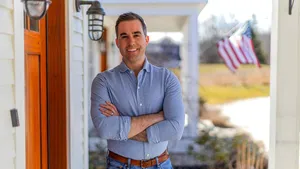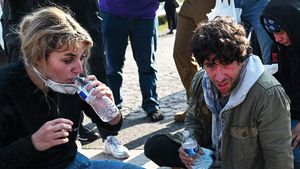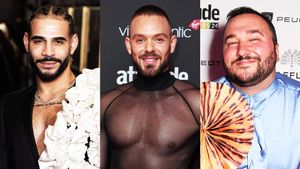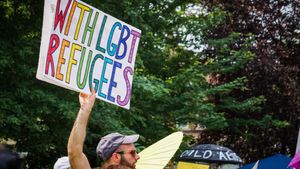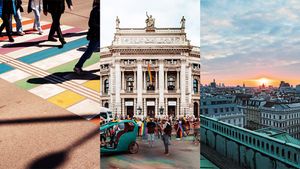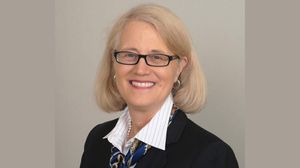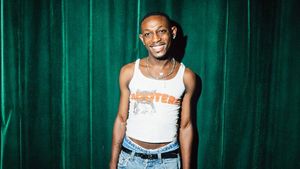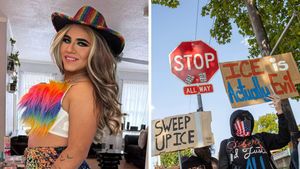By Leah Asmelash, CNN
When Lariba was growing up in James Town — a coastal neighborhood in Accra, Ghana — they never felt criticized for living the life they wanted to live, they said, even as an LGBTQ person.
Of course, there were certain areas in Accra they couldn’t go, like some religious communities that wouldn’t be friendly to presumed LGBTQ people, said Lariba, who is using a pseudonym for safety reasons. But there were also areas where anyone could go and be themselves, they said, neighborhoods where nobody ever questioned why someone may be dressed in a certain way or behaving in a certain manner.
Now, all that has changed, said Lariba, the executive director and co-founder of gender activist group One Love Sisters Ghana. If someone suspects that you, or someone you’re with, is gay — either from your gait, the way you dress, or who you may be holding hands with — you could be attacked, kidnapped or even lynched.
The shift, according to advocates, is largely due to a new anti-LGBTQ bill making its way through the Ghanaian parliament: “Promotion of Proper Human Sexual Rights and Ghanaian Family Values Bill.”
Introduced in 2021, this bill not only criminalizes LGBTQ relationships, but also those who support LGBTQ rights, with the possibility of being extended to journalists for what the bill calls “promoting” these issues, too. It also gives citizens a “duty to report,” encouraging people to report suspected LGBTQ people to the police or other authorities — a condition that has been particularly concerning for many people in the country. Though the bill has been in parliament for two years, it is now in its final stages, having just gone through a second reading in July. Unless the president moves to veto the bill when it crosses his desk, many are certain the bill will soon become law.
“All I see is disaster,” said Ghanaian singer Angel Maxine, who is transgender, in an interview with gal-dem in January. “If you live with a queer person, and the bill says you have the right to report them under the bill, then people will use it. And people who have done absolutely nothing wrong will be sent to prison.”
Though the bill has yet to be passed, the effects have been steadily mounting. Anti-LGBTQ content online was already gaining traction in the country in the five years before the bill, according to a report by reproductive justice organization Ipas, and advocates have said that online harassment has only gotten worse. At the same time, reports of physical violence against LGBTQ people have also increased, according to advocacy groups.
In April, four men were allegedly beaten in Kumasi, one of the largest cities in the country, because attackers thought they were gay, according to Rightify Ghana, an LGBTQ rights group. In June, a man reportedly arranged a sexual encounter with another man on Facebook, only to be met by a mob once he arrived. In July, a man was reportedly stabbed multiple times because of his sexual orientation, having been lured to a location via a dating app.
“Now, everything is turned upside down,” Lariba said. “It’s not safe anywhere.”
LGBTQ rights are now viewed as anti-African
Ghana isn’t the only African nation that has seen such a shift. Most countries in Africa criminalize same-sex activity and/or LGBTQ people, but enforcement can vary. In Ghana, for example, even as same-sex relationships were illegal prior to this current bill, LGBTQ centers and groups were still allowed to exist. If the bill passes, their existence will become illegal, too.
What makes this moment distinct is the heavy-handed enforcement.
This summer, Uganda passed one of the world’s harshest anti-gay laws, which includes punishing same-sex actions with life in jail. Despite criticism from around the world, the bill had the support of many lawmakers and religious leaders in the country.
In nearby Kenya, politicians have also proposed a bill that would further criminalize homosexuality in the country — a significant change, considering Kenya has granted asylum in the past to people fleeing persecution in neighboring countries based on their sexual orientation or gender identity.
And in Ethiopia, activists have reported an escalation in anti-LGBTQ sentiments, too. Attacks against people thought to be LGBTQ have increased, according to LGBTQ nonprofit House of Guramayle, and police forces in the capital have cracked down on bars, restaurants and hotels where same-sex activity is thought to occur.
But the situation in Ghana is distinct. Though Uganda’s law, which includes a possible death penalty for “aggravated homosexuality,” such as sex with a minor or sex while HIV positive — is harsher, Ghana’s bill represents a deep shift in the nation. Whereas Uganda has long been hostile to LGBTQ people, before this bill, Lariba says Ghana had become relatively tolerant. It was even “a bit liberal,” they added.
“Even though people know that to (some people) it’s not right for you to be who you are in the community, they still don’t have the right to come and hate you,” they said.
The division over anti-LGBTQ bills has led to a frayed relationship between countries in Africa and democratic countries in the West. According to many Ghanaian politicians and leaders supporting the bill, LGBTQ activities are anti-African, and go against the country’s cultural and religious values.
So when Western leaders like Vice President Kamala Harris in 2023 or, before her, then President Barack Obama in 2015, lecture African nations about their stances on LGBTQ rights, it is often paraded as an example of neocolonialism — the West trying to impose their culture on Africa.
 U.S. Vice President Kamala Harris is welcomed by Ghana President Nana Akufo-Addo in March of this year.(photo by Misper Apawu/AP/FILE)
U.S. Vice President Kamala Harris is welcomed by Ghana President Nana Akufo-Addo in March of this year.(photo by Misper Apawu/AP/FILE)
“We want the West to know that there is no way we are going to accept LGBTQIA+. We support all African countries, including Uganda, who are enacting laws against these activities,” said Dormaahene Osagyefo Oseadeeyo Agyemang Badu II, a traditional ruler in Ghana and also a High Court judge whose opinion holds massive political sway, back in April.
“Our custom is that if a man sees a woman he likes, he goes with his family to engage the family of the woman and they marry, and this is what the Bible also supports,” he continued. “We will never accept marriage between a man and a man or a woman and a woman.”
That comparison has had geopolitical implications — leading to an increasing sympathy in Ghana for countries like Russia, said Danny Bediako, director of LGBTQ rights group Rightify Ghana. Bediako did not want to use his real name for fear of reprimand.
Even though Ghana has a democracy with fair elections, press freedom and other rights, when it comes to LGBTQ issues, Bediako said figures like Russian President Vladimir Putin are held up as an example of a good leader — a shift that he called “disturbing.”
“When it’s about democracy, freedom of speech, press freedom, women’s rights, we don’t even look up to these countries,” Bediako said. “But on LGBT they want us to look up those countries.”
Despite what local leaders and politicians have said, international investigations have actually pointed to foreign interests as the driver for anti-LGBTQ inclinations in Ghana. The rise in homophobia, many argue, has been compelled by the work of US-based extremist evangelical groups, according to investigations from news outlets and NGOs.
A coalition group called the World Congress of Families, a US-based group with ties to the far-right, organized a “family values” conference in Accra in 2019, which many proponents of the bill attended, according to Ipas’ investigation. The conference spent much of its time attacking LGBTQ rights and the “dangers” of LGBTQ influence.
Brian Brown, the president of the WCF, told CNN in 2021 that his group did not write the bill nor did it provide instruction.
And Sam George, a member of Ghana’s parliament who introduced the bill, traveled to Utah last year to attend the African Family Policy Conference, an event hosted by Family Watch International, a US-based group founded by a Mormon activist with anti-LGBTQ views. In a Facebook post, George wrote that the bill was “celebrated by participants at the conference” and “is a major tool to fight this international agenda to destroy the fibre of our societies.”
In a statement to CNN, Family Watch maintained that “FWI has never supported or promoted any anti-homosexual bill there or in the other 194 countries in the world.”
The World Congress of Families has been criticized by the Human Rights Campaign for spreading anti-LGBTQ rhetoric to other countries, while Family Watch International has been called out for doing the same.
This so-called “imported homophobia,” as it is dubbed by some activists, has stunned some Ghanaians. When the bill was first introduced in 2021, Audrey Gadzekpo, a professor at the University of Ghana in Accra whose expertise includes gender and media, didn’t think it would stand. Before the bill’s introduction, many people in Ghana had a “live and let live” mentality, she said — they may not be the most accepting, but they were largely tolerant.
And it’s not like queer people haven’t existed in Ghana, she said. The language holds proof. “Kojo besia,” for example, is a phrase in the Akan family of languages, meaning an effeminate man, with the implication that the man is gay. “Supi” is another, used to describe a close, potentially sexual, relationship between two girls. Though kojo besia is a more traditional term, supi is modern, Gadzekpo said.
“It is common knowledge, but we don’t problematize it,” Gadzekpo said. “Why is that it was accepted, and all of a sudden it is criminal now?”
Still, though President Nana Addo Dankwa Akufo-Addo had previously stated that homosexuality would not be legalized in Ghana, anti-legalization has quickly pivoted to active criminalization. That shift has shocked Gadzekpo, and she points to foreign religious groups as the cause.
Ghana is a conservative and religious country, Gadzekpo said. So when Ghanaian politicians and leaders quote the Bible or the Quran about the sins of homosexuality, many people “buy into” it, she said. Some of the bill’s supporters have conflated homosexuality with pedophilia, and paint the bill as a protection of children and, of course, Ghanaian culture, she said.
“I think that a majority of Ghanaians have no problem with the bill,” she said. “So if you are an MP and you want to retain your seat, it’s easy to unseat you if you say you (don’t) support the bill, because it means you support immorality.”
As the bill progresses, anti-LGBTQ violence continues
For LGBTQ people in Ghana, the problems may only just be beginning.
As of April, Rightify had recorded more than 30 cases of violence and discrimination against LGBTQ people in the country, according to Bediako. In one case reported to Rightify, a group of five people allegedly poured perfume straight into a man’s eyes, beating him when he tried to shut them. They then shared a video of the violence on WhatsApp to his family and friends, demanding money for the man’s release.
These types of kidnappings have been on the rise since the bill’s introduction, Bediako said, but only a few cases are documented. Not every victim feels comfortable coming forward, and some are even threatened by their attackers, who claim they will release videos of the person to the police and the general public. That can be horrifying for the victim, Bediako said, as some have been forced to strip naked on video and make confessions about their sexuality.
“It scares me how people feel emboldened by this,” Bediako said.
Even if LGBTQ people in the country want to report actions to the police, the process can be an uphill battle. Police can be reluctant to pursue the case, and may instead arrest the victim for being LGBTQ, said Abdul-Wadud Mohammed, the communications director at LGBT+ Rights Ghana.
The entire situation has exposed LGBTQ people in Ghana to danger, Mohammed explained, both physical and online. LGBTQ centers and other spaces previously accepting of LGBTQ people have either closed their doors or denied queer people out of fear of repercussion, he said.
Out of necessity, LGBTQ people in the country have tried to adapt. Through apps like WhatsApp and Telegram, community members are able to warn others if there have been reports of attacks on presumed LGBTQ people in an area, Bediako said, and send information on what to watch out for and what actions to take.
Bediako himself has joined over 50 WhatsApp groups, he said, some of which have more than 200 members.
“We know we are reaching (more) community members, who can also share in other WhatsApp groups and also privately with other individuals and community members who may not be in WhatsApp groups,” Bediako said. “Just to help the awareness go far, so they can also be safe.”
Rightify also receives reports of cases through these apps, allowing the group to then follow up and help the victim or person reporting take action. And even these safe spaces are under threat: Rightify has seen an increase in people infiltrating some LGBTQ WhatsApp groups to target gay people, in an effort to “abuse” and rob them, Bediako said.
There’s only so much local activists can do. Some people have had to move due to being targeted, Mohammed said, while others have lost their jobs.
Despite the risk, Mohammed — currently studying in Nuremberg, Germany — still plans to return to Ghana. It’s his home, he said, and the work needed is on the ground. He wants to contribute what he can.
“I think most queer people in the diaspora are having these thoughts of trying to contribute to this fight of LGBTQ rights on the continent,” he said. “We can’t leave the way it is now.”
There may be some hope. Engagement with LGBTQ-related online content skewed more positively after a controversial 2021 police raid on an LGBTQ center in Accra, according to the Ipas report, going from 19% positive before the raid to 35% positive afterward. This could suggest, the report noted, that a growing number of Ghanaians do not approve of the anti-LGBTQ violence and stances, despite police actions and the viewpoints of political leaders.
And because sexual identity and LGBTQ issues have become hot topics in the country, more people are able and willing to talk about the issues, Mohammed said. Though before these topics were kept quiet, there’s now room to speak. As an activist, that trend gives Mohammed a sliver of optimism.
But it’s likely to get worse, he said, before it gets better.
----
The-CNN-Wire
™ & © 2023 Cable News Network, Inc., a Warner Bros. Discovery Company. All rights reserved.
From Your Site Articles
Related Articles Around the Web

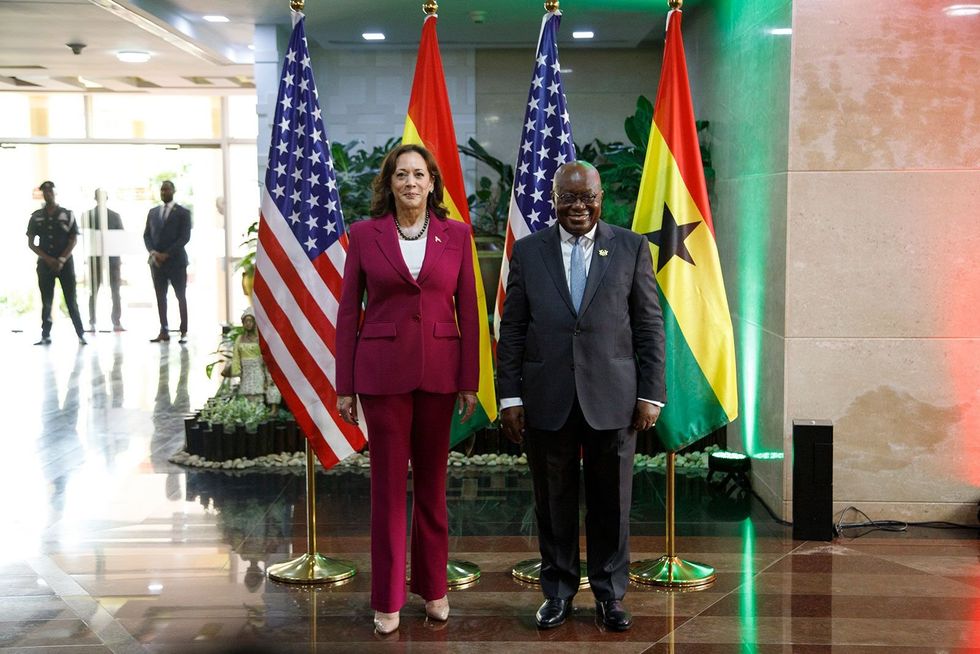 U.S. Vice President Kamala Harris is welcomed by Ghana President Nana Akufo-Addo in March of this year.(photo by Misper Apawu/AP/FILE)
U.S. Vice President Kamala Harris is welcomed by Ghana President Nana Akufo-Addo in March of this year.(photo by Misper Apawu/AP/FILE)


























